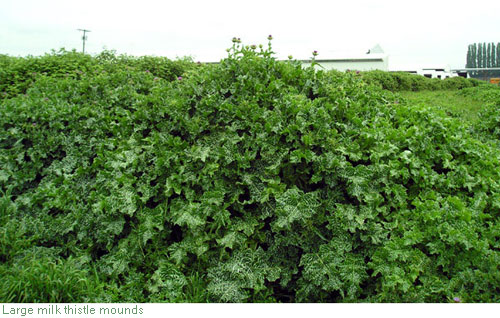You can see that the dock weren't exactly thriving either.
What could have led the once giving soil to forsake the grasses and poison the dock? Excess soil nitrate.
 |
| A few months later when the soil moisture starts to evaproate you can really see the salts being left behind |
We're all about minimizing water use in my house and a housemate was stepping outside to relieve himself in the night in the exact same spot. It's right next to the stairs out of the house so it was certainly the most convenient location in the yard.
The urea from the urine was converted to ammonium, then to nitrite and finally to nitrate by soil bacteria. The higher level of salts in the soil (a salt being any ionic compound) due to all the nitrate probably made it pretty hard for the plants to access water. The excess nitrate was also probably toxic for plant growth. So essentially what we're looking at is urea poisoning the soil biology and plant life in these patches.
After this year's pathetic winter rains subsided and the soil started to dry out, evaporation and capillary action brought water to the surface of the soil where it evaporated into the air. The nitrate salts that were dissolved in this water were then left at the soil surface. You can see where the salt accumulation has left the soil slightly white in these pictures taken a few months later.
This is a visual manifestation of research which show that urea can increase soil acidity and salinity. Here's one such study from Zhejiang University in China.
Now you might be saying, hold on, there's more to my urine than just urea. There is indeed, and the wonderful, "Composotion and Concetrative Properties of Human Urine" prepared for NASA, has a great table on page 51 which lists these goodies by concentration. Urea is the largest constituent of urine, making up 36% on average of its total solutes. Inorganic salts such as sodium chloride, potassium chloride and potassium sulfate make up 38% altogether. So the salt accumulation on the surface of this soil can't be blamed solely on urea.
I myself got in on the act of free urea applications on my blueberries - they wouldn't mind a little soil acidification after all. You can see again the accumulation of salts on the soil surface:
I just have automatic drip set up on these plants so there is never thorough surface irrigation to flush all these salts down through the soil.
While we're on the topic, another soil/urine mystery was recently explained to me. One spring day, walking by a cabin where someone had lived for the previous six months, I noticed an isolated patch of thriving milk thistle (Silybum marianum). This cabin had no toilet and the thisle patch was very close to his door step. This must have been where he relieved himself each night, but I never understood why the thistles thrived in those conditions. You could also see the milk thistles growing well on the downslope side of compost piles where the leachate would probably accumulate. I was able to go to an Elaine Ingham talk a few months ago (mind blowing!) and I had a chance to query her about this. Apparently thistles do best in soils with 50 ppm nitrate. So they absolutely love to grow in a cherished pee spot. Interestingly, milk thistle will also accumulate high levels of nitrate and this can be toxic to livestock.
Here are some pictures from the King County, WA, noxious weed website. I definitely appreciate the enthusiasm over milk thistle here!

 Note that the common theme among these pictures is that they're all on dairies where the cows are probably raising the soil nitrate levels a fair amount.
Note that the common theme among these pictures is that they're all on dairies where the cows are probably raising the soil nitrate levels a fair amount.
All this is not to say that urine is bad for the soil. On the contrary, it is an amazing fertilizer, it just has to be used properly. It's hard to think of another well rounded fertilizer which is as easily accessible. If you are metabolizing protein, good news, there will be lots of urea in your urine along with bonus ionic compounds that will deliver potassium, magnesium, calcium and phosphate to the soil.




